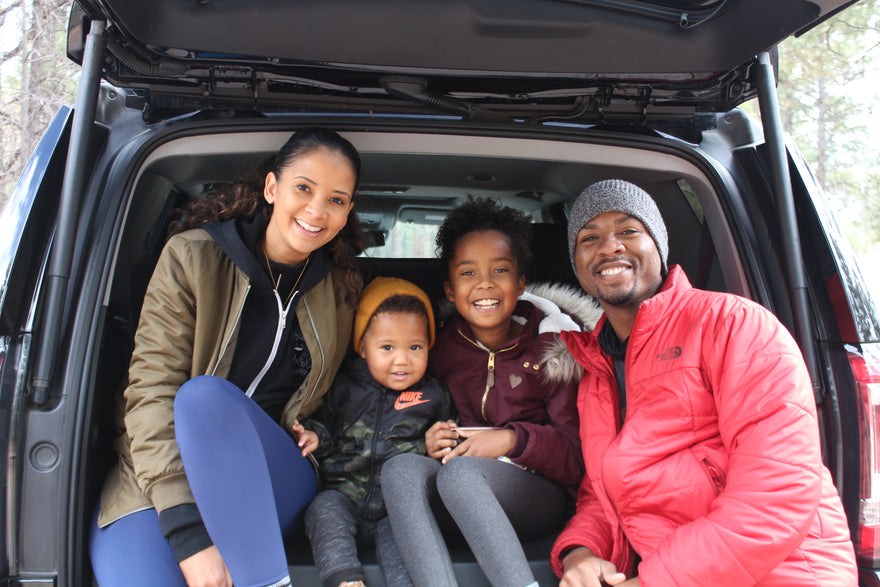BIPOC Parenting Series: Tristan's Story

As a community-focused company, Kabrita USA strives to be inclusive and to continuously celebrate diversity. In honor of Black History Month, Kabrita USA is featuring a BIPOC Parenting Series, for the entire month of February. The BIPOC Parenting Series centres BIPOC (Black, Indigenous, and People of Color) parents’ experiences. Our goal is to enhance greater representation of BIPOC parents in the media, as well as to amplify BIPOC voices and stories.
Today, we are sharing Tristan’s story about his fatherhood journey teaching his children and helping them see themselves.
Tristan's Story:
For as long as I can remember I’ve wanted to be a father. A statement most people would least likely expect from a man, especially a black man. For years I dreamt of having a squad of Gist boys to play games with, to laugh with, and to groom into kind-hearted men. Probably because I’m the oldest of 5 children and the only male. Yes, I’ve got 4 sisters and that’s a story for another day. Fast forward to being married with 2 children (Riyah, an 8-year-old girl & Aiden, a 2-year old boy) and I can’t fathom the idea of having another child. Who knew parenting would be so hard? I love my kids, but they are a lot of work.
A month after our marriage, we got pregnant. I guess you can say we were a bit eager. In all honesty, we were 30, both done with grad school, and both leaders within our organizations. We were beyond the “figuring it out” phase of life and were ready for another kid. So here we are. Two kids that we love and adore, and it has been both joyous and trying for a myriad of reasons.
One of the most trying is that we find ourselves raising two black children in a world that has yet to mature in its understanding of the power of diversity and has failed to equip itself in black culture. In a world where vats of information literally lie at our fingertips, we’ve remained uneducated where it matters the most. Just last year, Riyah and I sat together at our community pool and enjoying the sun when Jonathan, the child of one of our neighbors, and her classmate, decided to join us.
As we sat together, I could see intrigue on Jonathan’s face. He had questions. Moments later, he mustered up all of his strength and asked, “why does your skin look like that?” I sighed. Not because Jonathan did anything wrong, but because I was being forced to teach a child the basics of life because his parents had failed to do so.
Were we the first black people he interacted with? Did he not have a tv at home? Why did this 7-year-old kid not know about our skin? On top of that, I got to sit in my daughter’s seat for a moment. One I was very familiar with from my own childhood. She was the only black kid in her class that year and all I could think about was how often she found herself in situations like this and it broke my heart. Having my own experiences with race was one thing, but now my daughter had to experience it? How long would this be our battle?
I responded. “God made our skin this way”.. “It’s just like yours, just darker”. He asked another question. “What about the bottom of your feet? Why is it lighter than the rest of your body?” The poor kid had no idea. Riyah chimed in as she was completely over this conversation at this point. “It’s just the way our skin looks”.
Having to parent children in a world that questions their beauty and worth based on the color of their skin is a constant and exhausting battle. It requires a level of affirmation that can’t afford to skip a day at work. So, we teach our kids whether they are ready for it or not, that the world hasn’t been kind to black people.
We buy them books with little black boys and girls who look like them. Who go on adventures, solve mysteries, and make a difference in the world. We buy black dolls and action figures. We watch black tv shows made for youth. We strive to help them see themselves in a world that often overlooks them. And while this is again, one of the most trying parts of being a black parent, it has also been one of the most joyous. We get to celebrate our skin together and our communities are better for it.
Kabrita USA BIPOC Parenting Series shares genuine stories written by parents from the BIPOC community. Each story offers a different perspective from their personal parenting experience. To read more stories, please visit our Nourish Blog.